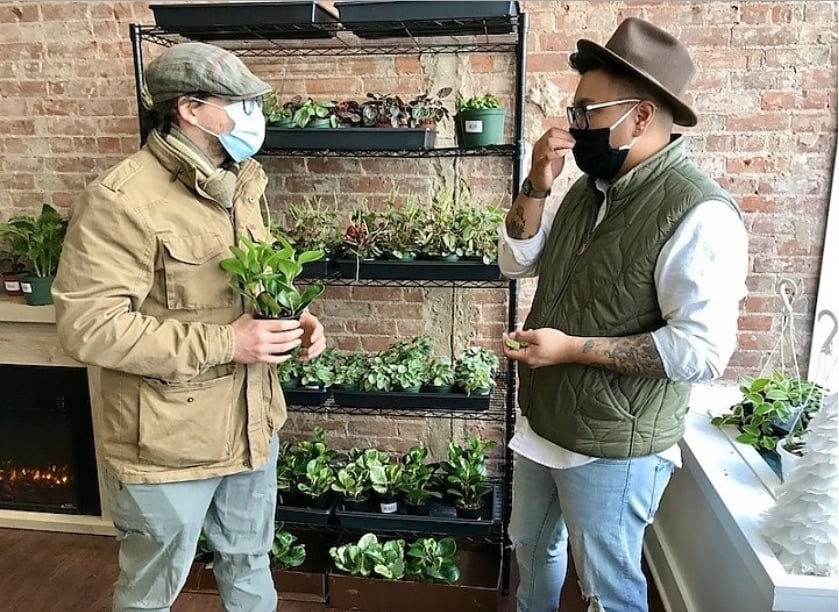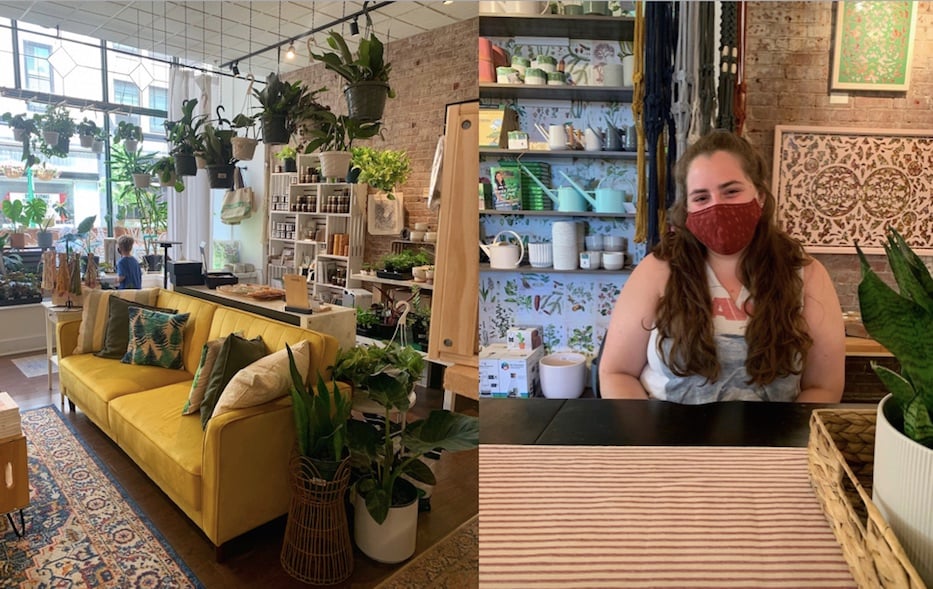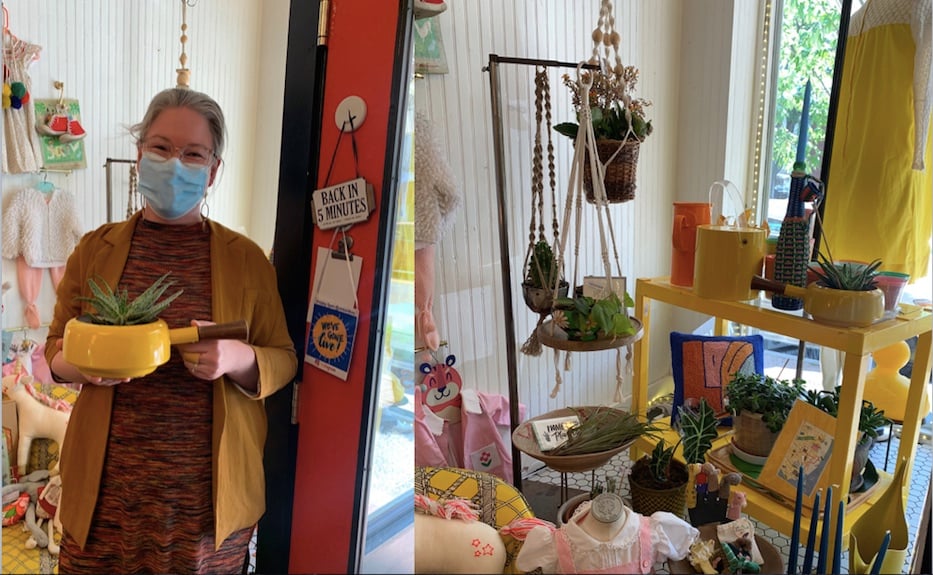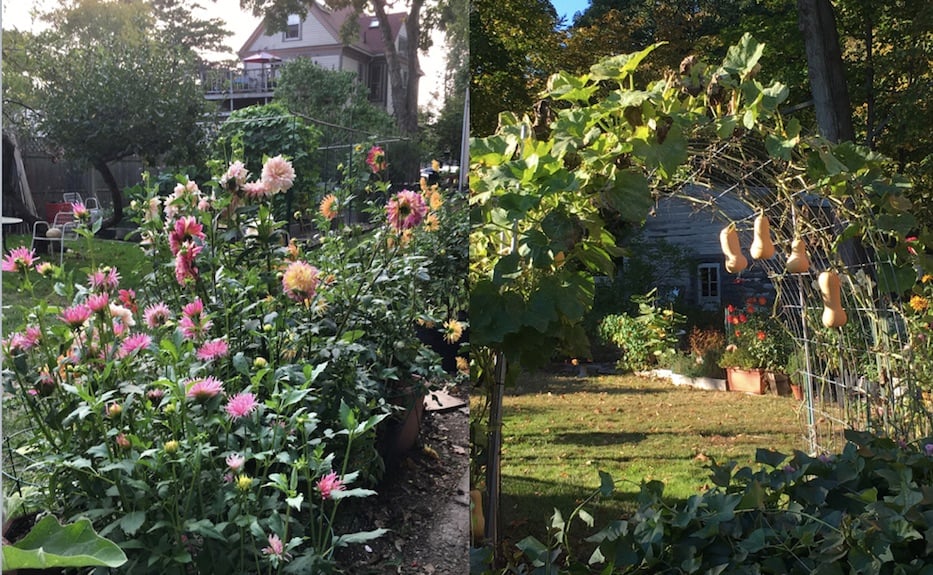
Saldi (at right) with a customer earlier this year. Lisa Reisman Photo, with permission from the New Haven Independent.
Ralph Saldi and his husband Luis began propagating plants long before Covid-19. When the pandemic struck, Saldi lost his job as a visual merchandiser, where he designed floor spaces at various businesses. His husband started working remotely. It was the beginning of a green chapter for the two.
Before the pandemic, Saldi was constantly running around and moving from one thing to the next. With the newly given free time, he and Luis spent most of their days gardening and caring for their plants. Soon, the couple had the idea to take their propagations to the next level. Bark & Vine, an online shop, debuted in Fall of 2020.
“Plants allow you to slow down,” Saldi said. “We wanted to share the love of plants and share the love of gardening with other people.”
The online shop was a huge success—so much so that Saldi looked for real estate. Bark & Vine opened a brick and mortar on 49 Orange St. in February 2021. He said the Ninth Square neighborhood was a perfect and central location to house the plant shop as the area is surrounded by arts and culture.
The interior of Bark & Vine is designed similarly to an apartment, with a plush yellow couch as the centerpiece surrounded by a jungle of plants. This allows customers to get a sense of what the plants look like in homes.

Left: Bark & Vine. Right: Shop Supervisor Isabella Pellino. Elsa Holahan Photos.
Artist Isabella Pellino is the shop supervisor at the store. Pellino joined the Bark & Vine team in March and quickly became entranced by the environment. She described herself as a “crazy plant person” and a “plant nerd,” characteristics that made her a perfect fit for the job.
“Plants make me happy and they have helped me through hard times,” she said.
It's part of a trend in owning and nurturing plants that has grown with the pandemic. In city environments, people may start to feel disassociated with nature, Pellino said. Indoor plants allow people who cannot regularly experience nature to experience it in their own home. She believes people are buying more indoor plants in the pandemic,because of the social isolation.
“In this crazy year, people have needed and wanted consistency and something that they can care for, and that’s the joy of plants,” she said.
Many restaurants and businesses have been integrating plants into their interior design. This process is termed biophilic design. Recently, for instance, Your Queer Plant Shop added a vertical plant wall to the inside of Barracuda Bistro & Bar, where it now welcomes visitors.

Left: Gonzales at Vintanthro. Right: Plants on plants on plants. Elsa Holahan Photo.
Melissa Gonzales, owner of Vintanthro Modern and Vintage, has been incorporating plants into her store for several years. The store is located in the heart of Westville Village on 895 Whalley Ave., where she has been since 2018.
Every three months, Gonzales shops for plants at Connecticut wholesales, where they are bought directly from the grower. After bringing the plants back to Vintanthro, she sells out shortly after each trip.
Gonzales noticed during the pandemic, a plant craze began to arise. She was selling out of plants faster and made more trips to the wholesales.
The pandemic also caused a shift in the popularity of Vintanthro's products. Prior to the pandemic, the store’s main sales were clothing. People would come in, try on and then buy dresses and shirts for social gatherings and parties.
Now, people come into Vintanthro wanting to redecorate their homes after investing a great deal of time and energy purging, cleaning and nesting in their interior spaces.
“Beautifying your environment does so much for your mental and emotional wellbeing,” Gonzales said. “Plants are a big part of that.”
Vintanthro utilizes vintage ceramics, baskets, and containers for pots of their plants. These creative pairings of plants and pots allow customers to express themselves and spruce up their environment all in one.
“Plants can fit in with any decor style,” she said, “it’s a way to make you smile and add a little bit of life to your environment.”
Biophilic design goes beyond appearance—it can also be part of healing. As the founder of Healing and Liberation Counseling, which he stepped away from in June, Enroue Halfkenny sees plants as a major element of his spiritual work. Halfkenny’s spiritual practice is fundamentally about connecting the mind to and with nature, and understanding relationships with nature.
In his practice, plants cleanse negativity and ensure protection, encouragement, and strength upon the practitioner. Halfkenny incorporates healing plants in the form of spiritual baths: a medley of plants, pedals and herbs that spiritually cleanse both the body and the mind.
“Spiritual baths are about cleansing the barrage away and allowing the person to return to their internal voice,” he said. “Beforehand, things feel really chaotic and disruptive, then taking a spiritual bath feels calm and at peace--and that peace lasts beyond the bath.”
Halfkenny’s spiritual practices highlight how plants have been an important healing tool and resource prior to the pandemic, addressing other systems of oppression, hardship, and injustice.
“It’s these relationships to plants that have consistently supported us,” he said.

Maz Burbank's garden earlier this year. Elsa Holahan Photos.
Maz (Medeline) Burbank lives with her two friends in Westville. As soon as the three housemates moved in together, they started a large garden in the backyard. Burbank has been gardening her entire life, a skill that was passed onto her from her mother, and finds comfort in keeping with cycles of nature.
She has dedicated more time and attention to her garden throughout the pandemic. Last year, she was isolated from her family, and spent more time at home. “There wasn't much else to do,” she said.
Two years ago, Burbank was sick with lymphoma and has since faced chronic depression. Both gardening and being outdoors have aided her tremendously throughout her health journey. For Burbank, her time spent outside was—and continues to be—her therapy.
“Gardening, being outside and digging in the dirt is very healing," she said. "It’s my life line."
Elsa Holahan is a rising junior at James Hillhouse High School. This piece comes to the Arts Paper through the Spring 2021 cohort of the Youth Arts Journalism Initiative (YAJI), a program of theArts Council of Greater New Haven. This year, YAJI remained virtual due to the COVID-19 pandemic. Read more about the program hereor by checking out the"YAJI" tag.